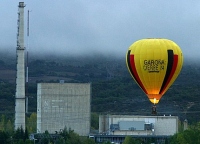The last week has been a turbulent time in two anti-nuclear European countries, with Spanish leaders under fire after their Garoña decision and a short-circuit sparking further debate in Germany.
 |
| Greenpeace make themselves known alongside Garoña. Both are battling President Zapatero on his execution of nuclear policy (Image: Greenpeace) |
Garoña owner Nuclenor said yesterday its board had unanimously agreed to bring a case against the four-year decision, which they consider illegal. Safety regulators had said the plant could operate for ten more years given certain upgrades, but the Ministry of Industry, Tourism and Trade had the final say and made what the Spanish nuclear industry called an 'irresponsible' and 'arbitrary' decision.
Nuclenor has also sparred with Zapatero after he claimed on national radio that only one power reactor in the world was older than Garoña's 38 years. In fact, Nuclenor pointed out, there are 16 and seven of these have licenses to operate until the age of 60.
Spain has enjoyed success with renewables but has still fallen far short of its Kyoto Protocol commitment to limit emissions to 115% of 1990 levels. As a result it is set to spend billions of euros on emissions credits before 2012 to make up the difference. Already annoyed at this failure, Greenpeace has now branded Zapatero 'completely spineless' for failing to shut down Garoña.
Meanwhile in Germany the restart of the Kruemmel nuclear power plant was marred by a switchyard short-circuit which wrecked two transformers. Owner Vattenfall has warned that the parts will take several months to replace. Kruemmel had previously been offline for two years after a transformer fire, but it is not unusual for German operators to take their time in returning reactors to service as a way to stretch out their generation limits.
Until the German federal election on 27 September nuclear power will be covered extensively in the media. The Kruemmel short circuit was registered as having 'no safety significance', but Vattenfall found that a required monitoring device had not been installed prior to the start-up and sacked plant manager Hans-Dieter Lucht for the mistake. In response, federal environment minister Sigmar Gabriel called for tighter regulation and for the German public to vote for the closure of the 'problematic reactors'. This was countrered by Markus Soeder, environment minister for the state of Bavaria, who said that nuclear power is a 'bridging technology' because there is no feasible replacement for the 60% of Bavarian electricity that comes from nuclear power plants.




_66891.jpg)
_30199.jpg)
_72306.jpg)






